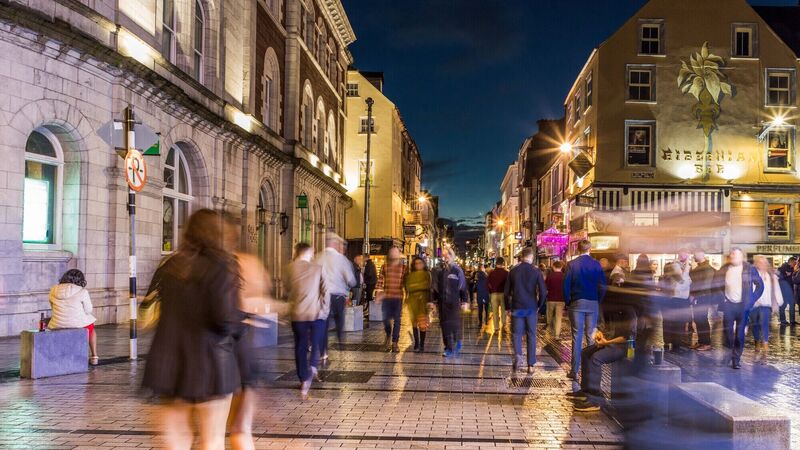'We want there to be more dance floors, not less': Campaigners want more supports for nightclubs

Calls for increased supports for the nightlife industry in Cork and across the country have been made as the latest research from nightlife campaigners Give Us The Night warns that the nightclub scene could be on the verge of collapse. Picture: David Creedon
Calls for increased supports for the nightlife industry in Cork and across the country have been made, as the latest research from campaigners Give Us The Night warns that the nightclub scene could be on the verge of collapse.
According to their research, there are currently 83 active nightclubs in Ireland, compared to the figure of 110 pre-Covid in 2019.
In Cork, according to the group, there are just five fully fledged nightclubs currently operating.
At the turn of the century, Ireland was home to 522 nightclubs.
With the number since then decreasing significantly, the question must be asked: what does the future look like for the Cork and Irish nightclub scene?
Give Us The Night are an independent volunteer group of professionals operating within the nighttime industry, who campaign for positive changes to nightlife in Ireland, and with particular regard to music venues.
The stark statistics from Give Us The Night show that, since 2000, Ireland has lost almost 84% of its nightclubs.
Nightclubs now account for only 0.6% of the country’s 14,085 active liquor licences, the advocacy group says.
Give Us The Night say that they feel nightclubs are essential spaces for music, community and creativity to thrive, while also offering a vital outlet for self-expression and connection.
The group feel now is the time to demand meaningful government support for nightlife, and addressing outdated licensing laws, reducing barriers for new venues, and protecting existing spaces.
Speaking to The Echo, Sunil Sharpe of Give Us The Night discussed the declining numbers and how the cost of living crisis has had a knock on effect on the nightclub industry.
“I think one of the biggest factors really that’s hurting nightclubs at the moment is simply footfall. There are not as many people out at night.
“What we are most concerned about overall is that in five or 10 years, we may not even have the amount of dance floors left in Ireland that we do now.
“We want there to be more dance floors, not less.
“So you have to make the business model of running a dance venue just that little bit easier. We also need to attract new venue operators into the market.
“The reality is that we have lost a lot of venues, and there have been no new venues opening.
“Whereas in the past, when venues shut, other venues opened here and there.
“It is really important going forward that we get people of all ages back into nightclubs, and crucially, feeling at home in these venues again.”
Mr Sharpe added: “The challenge now and in the future is getting people feeling at home in the venues, and feeling like they want to support and go back to that venue the following week.
“Critically, we have to make the experience more affordable.
“That’s the main issue for most people, that nightclubs and going out at night in general, is unaffordable to do on a regular basis.
“We want more dance venues and we want more dance venues to be able to remain sustainable.
“If it is that we can diversify the offering while we do that and without alcohol having to be as central to the offering as it was in the past, that is definitely a positive for us.”
Give Us The Night has also called for the Irish government to introduce new legislation which could enable extended opening hours for nightclubs and bring more operating costs in line with other European Union nations.
Among the recommended areas which Give Us The Night suggest to reform are creating a nightclub-specific permit and introducing more 24-hour transport routeways.
Cork-based Natalie McCormack is with the Electronic Music Council, a community which supports a positive and sustainable electronic music economy.
She tells The Echo it is really important for cities such as Cork to have a thriving nightlife sector, and hopes the relevant supports are put in place to ensure this is possible.
“There’s quite a few things that need to be done, if I’m honest.
“I represent the Electronic Music Council.
“I focus a lot around electronic music and the professionals that work within that, particularly in Cork. So I’d like to see that they’re able to do their craft more successfully.
“At the moment, there is a very short time-frame where people can really get that.
“With there only being five places [in Cork] at the moment that we can really do that consistently, it would be nice to see maybe one or two having slightly later opening time as 2.30am is quite an early closing time, when you compare to across Europe.
“I think the second thing I would definitely like to see would be more towards the operators and the venues, where there is a bit more of a streamlined process where they can apply for licences.
“At the moment, it is a long process, it’s quite expensive, and it doesn’t always help the operator.
“Also, what I would like to see for nightclubs in the future would be, I think, to reframe what nightclubs looks like.
“You know, like, it’s not just the space of dancing. There’s lots of different parts to it and I’d like it to see more of a cultural institution.”
Across Europe, in cities such as Berlin, Amsterdam and others, extended nightlife is something which is embraced, where venues can operate almost 24/7 on certain weekends.
It is argued that Ireland’s restrictive closing times limit late night cultural activities and stifle the nightlife culture.
Ms McCormack also pointed to a need for public transport improvements to support extended operating times for venues.
“For Cork city, I definitely think that we do need to think how, if there were some later opening hours, how do we support that?
“What would it look like for the taxi operators, and would there be opportunities for bus routes, things like that.
“In Spain they have done it for years.
“If we were to compare to Manchester and London and places like this, they’re opening until 6am, sometimes even 8am. Some even have 24-hour licences.
“I don’t think Cork necessarily needs to go [that] far, but I do think there is some case where we can make it better for Cork to open a little bit later.”
In terms of what her message for the Irish government would be with regards to injecting life into the Irish nightclub industry, Ms McCormack said: “We need to think about how we socialise, and that there should be more flexibility for us to do that.
“At the moment, it’s a little bit too regulated and it forces us to behave in certain ways.
“I think it will be nice to have more flexibility, more spaces, more cultural recognition for what that means in the evening, in terms of music.
“Just really thinking about how we make that shift.”







 App?
App?


